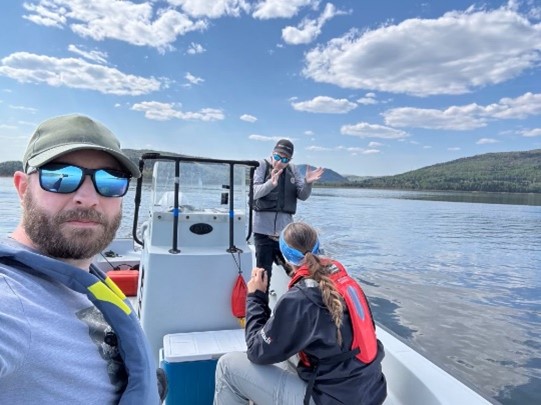Profile of Jason Harquail
Building bridges that will last for generations

Jason Harquail, is a proud Mi'kmaq and the current manager of the Bridging Team with the Indigenous Science Division (ISD) at Environment and Climate Change Canada (ECCC). Jason's work is essential to building partnerships with Indigenous communities to mitigate the impacts of climate-related and human-induced change.
The importance of land-based learning
Jason's interest and connection to the environment began at a young age. He recalls, “I was very fortunate to have my father out on the land with me. He didn't just teach me about nature but helped me feel it through his stories.” His father would share lessons about the respect and relationships his ancestors had with nature. He also shared how human impacts had not only changed the ecosystems but how these changes impacted traditional Indigenous food sources and ways of being. This exposure to Indigenous science led Jason to pursue a lifetime of learning and action through land-based literacy.
Indigenous science is a culturally specific method of accumulating knowledge, refining hypotheses and changing practices by drawing from First Nations, Inuit and Métis Peoples' deep understanding of the natural world. It has been utilized by Indigenous Peoples for thousands of years to generate and continually advance Indigenous Knowledge about the environment.
Turning passion into a career
I’m incredibly grateful for the chance to spend time with and learn from so many Elders and Knowledge Holders. Their teachings have deepened my understanding in ways I couldn’t have imagined and there is still so much more to uncover.
Jason's passion led him to start working with the New Brunswick Aboriginal Peoples Council in 1999, where he started as a fisheries monitor and later became the Communal Commercial Fisheries Manager. Through his work, he had daily communication with the Department of Fisheries and Oceans, Industry and Indigenous Fishermen as well as other Indigenous organizations. He worked to incorporate Indigenous practices, including, “taking only what you need and building respect between all living things,” to address issues he saw in the fishing sector. Through his work, it became clear that there was a greater need for understanding of Indigenous Knowledge and science in the sector.

His work escalated to the federal level when he was appointed as a member of the Aboriginal Traditional Knowledge Subcommittee (ATKSC). His role with the ATKSC is to identify knowledge gaps and provide guidance on incorporating Indigenous Knowledge into the Committee on the Status of Endangered Wildlife in Canada (COSEWIC) species assessment process. He collaborated with Elders and Knowledge Holders to develop the Aboriginal Traditional Knowledge: process and protocols guidelines. These guidelines outline an approach and specific steps to facilitating access to and the gathering of the available Aboriginal Traditional Knowledge as well as the integration of that knowledge into the COSEWIC species status assessment process.
Familiar with his work with the ATKSC, Jason was approached by Dr. Myrle Ballard and Dr. Alexa Alexander-Trusiak to work at ECCC in the newly-formed ISD.
Partnerships for holistic solutions
The most fulfilling part of my job is working closely with our Indigenous communities. I am able to build relationships, learn from their perspectives and contribute to meaningful change.
The ISD was created in 2022, and is a key component of advancing the United Nations Declaration on the Rights of Indigenous Peoples Act.The ISD works to build and maintain relationships with holders of Indigenous Knowledge. This allows them to collaborate on environmental research projects, including a clam garden with the Kwiakah Nation in British Columbia.
In 2023, Jason became one of ISD's first Aki Navigators. The word Aki means “land” in Anishinaabe, and a Navigator is someone who explores, or “walks the land.” His role is to bring awareness, understanding and recognition of Indigenous science as a distinct science and one that's equal to Western science approaches through Indigenous-led projects.

Jason and his team work directly with the communities to address the impacts they are experiencing due to climate and human-induced change. “The approach is not one of consultation but to foster healthy, long-term relationships with Indigenous communities in a respectful way”, explains Jason. They have continuous contact with communities to build and maintain trust and through respect and reciprocity.
Aki Navigators help bridge gaps by connecting Indigenous scientists and communities to funding and other opportunities for support and collaboration. This includes facilitating Indigenous science knowledge exchanges to build and share capacity as well as create a positive and reinforcing environment for Indigenous scientists.
Currently, he is partnering with the Ugpi'ganjig First Nation, located in northern New Brunswick, to revitalize the clam gardens and ecosystem in the Eel River. Jason is planning to bring together local Elders, community members, youth and technical consultants through community events and knowledge-sharing sessions to inform the restoration process and reinforce traditional practices. Bringing Indigenous Knowledge and science to Western scientific practices in an equitable manner can contribute to more sustainable approaches to environmental management and better address the specific challenges faced by the community.
Youth are the future
Now a father himself, Jason is carrying on the tradition of walking the land and sharing knowledge within his own family and by empowering youth through his work. Inspired by his own experiences, he is dedicated to involving young people in all his projects. “I started as a curious young person, always asking questions and wanting to know more. Having youth involved in ISD projects is crucial. They are our future knowledge keepers and protectors of Mother Earth, something we all should hold dear to our hearts.”